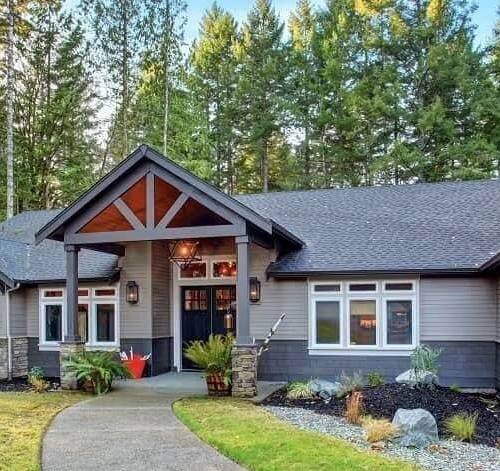What is home appreciation and how is it calculated?
Contributed by Karen Idelson
Feb 8, 2026
•5-minute read

Your home is likely the most valuable investment that you have. It also has the potential to increase in worth over time. You may already know that you build equity in your home with each mortgage payment. Homeowners can also accrue wealth through appreciation. This happens when the market value of a house increases over time either through increased demand for homes in your area, home upgrades that you make on your property, or other factors.
Measuring appreciation is simple. You subtract your original purchase price from your property’s current home value. In this guide we’ll discuss some of the drivers of home appreciation, how it can impact your long-term financial picture, and factors that may influence how quickly your property value may climb.
What does home appreciation mean in real estate?
Home appreciation refers to the process by which your home or an investment property gains value over time. Increasing property value can lead to bigger profits when selling or increased monthly rental income for investors.
Increasing home value also means you gain more equity in your home. You can access that equity by using a home equity loan or home equity line of credit,1 which lets you borrow against your home equity. You also gain access to your equity when you sell your home.
Home appreciation vs. depreciation
As the names imply, home appreciation and depreciation are opposites. While appreciation refers to an increase in home value, depreciation refers to a decrease.
Several factors can lead to home depreciation. And like home appreciation, some factors, such as the housing market, the location of the home, and neighborhood developments, are out of your control. Other variables that can lead to home depreciation include the home’s age and condition.
To minimize the decrease in a home’s value, homeowners can focus on regular maintenance, renovations, and upgrades inside and outside their houses. Keeping up with the latest local real estate market trends should help you make strategic property improvements.
What is the average home appreciation rate?
Determining the average rate of appreciation for homes can be difficult. The real estate market is highly local, and the values of individual homes within an area can vary. Some homes may be falling in value even while the overall market sees price appreciation.
In the past couple of years, appreciation has slowed, possibly due to a weakening economy, growing inventory, and rising mortgage rates. Still, homes have tended to rise in value. Between Q2 2024 and Q2 2025, the typical home rose in price by 3.8%.
Some markets have seen more or less appreciation. For example, homes in New York have risen in value by 7.5%, while those in Florida have gone up by just 1.1%.
What factors affect home appreciation?
A range of factors can affect home appreciation. Some are within a homeowner’s control, and others can be harder to predict. The most common factors that impact home value include:
- The housing market: The housing market can affect a home’s appreciation. Supply and demand play a critical role in appreciation. In a seller’s market, home appreciation will increase. A buyer’s market may lead to home values plateauing or decreasing over time.
- Location: The location of a home will impact its appreciation. While the national average can be a good indicator of overall trends, localized data displays how real estate appreciation can vary between cities, neighborhoods, and property types.
- Interest rates: Interest rate trends affect appreciation due to their impact on prospective home buyers. Low interest rates typically motivate buyers to buy now, which pushes.
- Home improvements: Home improvements and renovations can have the most significant positive impact on your home value over time.
How is home appreciation calculated?
You can calculate home appreciation in two ways.
One is by simply finding the amount by which a home has appreciated. Use this formula:
Current home value – home purchase price = total appreciation
For example, if a home is now worth $410,800, the median value of a home in Q2 2025, but was purchased for $325,000, it’s appreciated by $85,800.
You can also find the percentage of appreciation. To do that, use this formula:
(total appreciation / initial cost) x 100 = appreciation rate %
Using the above example, you’d find that the home has appreciated by 26.4%
($85,800 / $325,000) x 100 = 26.4%.
You can also use a house price calculator to help you calculate a home’s appreciation.
How can you add value to a home?
You can increase your home’s value by making additions or by making improvements that make the home more comfortable or that add additional utility or usefulness to the home.
- Exterior and interior upgrades: Enhanced curb appeal can go a long way toward adding value to a home, but interior renovations are equally valuable. If your home looks run-down or outdated, it may be time to invest in some upgrades that can make your home easier on the eyes and easier to sell.
- Increased energy efficiency: Making a home more energy-efficient can increase the property’s value and decrease your monthly energy costs. One of the most popular energy-efficient upgrades is solar panels.
- Increasing square footage: Increasing a home’s square footage can also increase its value. Consider adding a deck or building an addition. The more square footage a home has, the more value it can hold.
FAQ about property appreciation
Home appreciation is as important to understand as it is complex. Let’s review the most frequently asked questions homeowners have about property appreciation.
How much does a house appreciate per year?
How much a home appreciates in value each year depends on many factors, but over the past year, the average appreciation across the U.S. was 3.8%. You can get more information and data by looking at the Federal Housing Finance Administration’s House Price Index.
Do manufactured homes appreciate?
Manufactured homes permanently affixed to land (real property) historically appreciate at the same market rate as traditional stick-built homes, so you won’t have to worry about sacrificing future value if you choose this form of affordable housing.
What is the average home appreciation in the US?
Over the past year, between Q2 2024 and Q2 2025, the average home has appreciated in value by 3.8%. While prices are expected to continue climbing in many areas, some markets have seen price decreases. A lot of this variation can be attributed to local housing market conditions and location.
The bottom line: Take steps toward positive home appreciation
Whether you’re managing a rental property, flipping a house, or investing in your dream home, home appreciation is a key factor that influences a property’s future value. Positive home appreciation can make it easier to rent a home and earn a high rental income or sell it and make a hefty profit.
Take steps to improve your house appreciation with home improvements, such as energy-efficient upgrades or increasing the square footage.
While you can’t control some factors related to home values, like interest rates and the housing market, you can be proactive and grow your home’s value through regular home improvements and upgrades.
If you’re ready to take the next step toward homeownership, start the approval process today with Rocket Mortgage.
1 Home Equity Loan product requires full documentation of income and assets, credit score and max loan-to-value (LTV), combined loan-to-value (CLTV), and home equity combined loan-to-value (HCLTV) ratios. Requirements were updated 11/19/25 and are tiered as follows: 680 minimum FICO with a max LTV/CLTV/HCLTV of 80%, 700 minimum FICO with a max LTV/CLTV/HCLTV of 85%, and 740 minimum FICO with a max LTV/CLTV/HCLTV of 90%. Your debt-to-income ratio (DTI) must be 50% or below. Valid for loan amounts between $45,000.00 and $500,000.00 (minimum loan amount for properties located in Michigan is $10,000.00). Product is a second standalone lien and may not be used for piggyback transactions. Product not available on Ameriprise products. Guidelines may vary for self-employed individuals. Some mortgages may be considered “higher priced” based on the APOR spread test. Higher priced loans are not allowed on properties located in New York. Additional restrictions apply. This is not a commitment to lend.

TJ Porter
TJ Porter has ten years of experience as a personal finance writer covering investing, banking, credit, and more.
TJ's interest in personal finance began as he looked for ways to stretch his own dollars through deals or reward points. In all of his writing, TJ aims to provide easy to understand and actionable content that can help readers make financial choices that work for them.
When he's not writing about finance, TJ enjoys games (of the video and board variety), cooking and reading.
Related resources
4-minute read
What is fair market value (FMV) in real estate and how is it calculated?
Fair market value (FMV) in real estate is an assessment of a property's worth in an open market. Learn how FMV is calculated and what it's used for.
Read more

5-minute read
Appraised value vs. market value: Knowing the difference
Knowing the difference between appraised value vs. market value is key when purchasing a home. Learn more about the role each plays in real estate transactio...
Read more
10-minute read
The 10 cheapest states to buy a house in 2025
Learn about the cheapest states to buy a house in 2025 based on the cost of living, movement of house prices, median house prices and median household income...
Read more